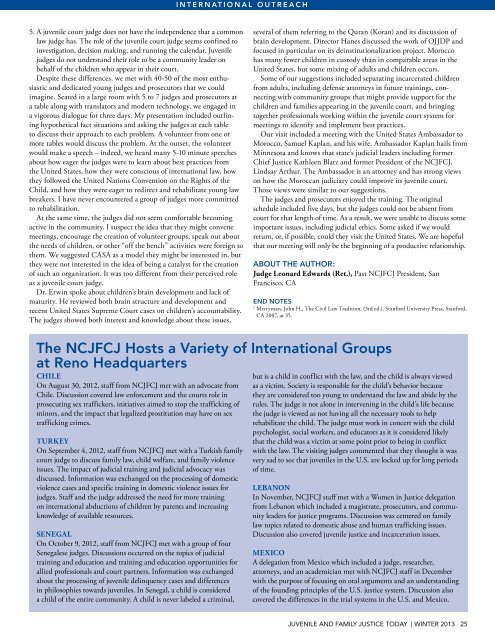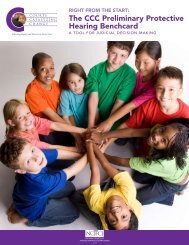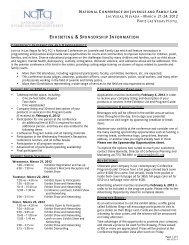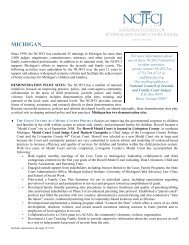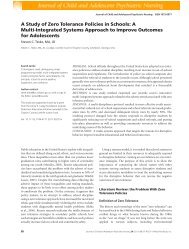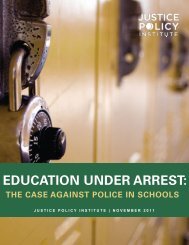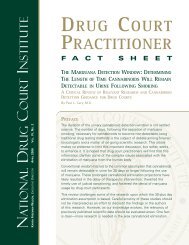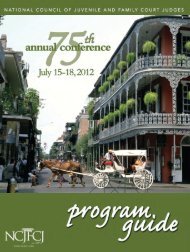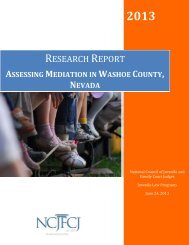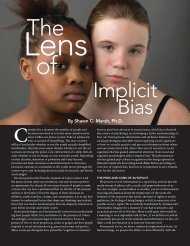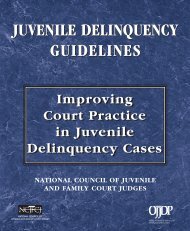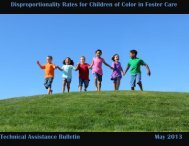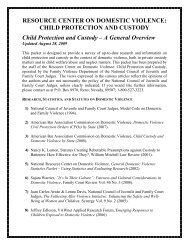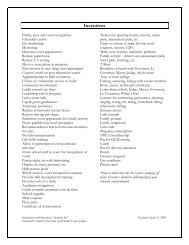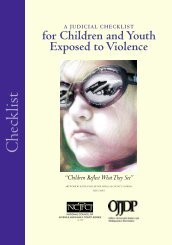dowNload - National Council of Juvenile and Family Court Judges
dowNload - National Council of Juvenile and Family Court Judges
dowNload - National Council of Juvenile and Family Court Judges
Create successful ePaper yourself
Turn your PDF publications into a flip-book with our unique Google optimized e-Paper software.
INTERNATIONAL BRIEFSOUTREACH<br />
5. A juvenile court judge does not have the independence that a common<br />
law judge has. The role <strong>of</strong> the juvenile court judge seems confined to<br />
investigation, decision making, <strong>and</strong> running the calendar. <strong>Juvenile</strong><br />
judges do not underst<strong>and</strong> their role to be a community leader on<br />
behalf <strong>of</strong> the children who appear in their court.<br />
Despite these differences, we met with 40-50 <strong>of</strong> the most enthusiastic<br />
<strong>and</strong> dedicated young judges <strong>and</strong> prosecutors that we could<br />
imagine. Seated in a large room with 5 to 7 judges <strong>and</strong> prosecutors at<br />
a table along with translators <strong>and</strong> modern technology, we engaged in<br />
a vigorous dialogue for three days. My presentation included outlining<br />
hypothetical fact situations <strong>and</strong> asking the judges at each table<br />
to discuss their approach to each problem. A volunteer from one or<br />
more tables would discuss the problem. At the outset, the volunteer<br />
would make a speech – indeed, we heard many 5-10 minute speeches<br />
about how eager the judges were to learn about best practices from<br />
the United States, how they were conscious <strong>of</strong> international law, how<br />
they followed the United Nations Convention on the Rights <strong>of</strong> the<br />
Child, <strong>and</strong> how they were eager to redirect <strong>and</strong> rehabilitate young law<br />
breakers. I have never encountered a group <strong>of</strong> judges more committed<br />
to rehabilitation.<br />
At the same time, the judges did not seem comfortable becoming<br />
active in the community. I suspect the idea that they might convene<br />
meetings, encourage the creation <strong>of</strong> volunteer groups, speak out about<br />
the needs <strong>of</strong> children, or other “<strong>of</strong>f the bench” activities were foreign to<br />
them. We suggested CASA as a model they might be interested in, but<br />
they were not interested in the idea <strong>of</strong> being a catalyst for the creation<br />
<strong>of</strong> such an organization. It was too different from their perceived role<br />
as a juvenile court judge.<br />
Dr. Erwin spoke about children’s brain development <strong>and</strong> lack <strong>of</strong><br />
maturity. He reviewed both brain structure <strong>and</strong> development <strong>and</strong><br />
recent United States Supreme <strong>Court</strong> cases on children’s accountability.<br />
The judges showed both interest <strong>and</strong> knowledge about these issues,<br />
several <strong>of</strong> them referring to the Quran (Koran) <strong>and</strong> its discussion <strong>of</strong><br />
brain development. Director Hanes discussed the work <strong>of</strong> OJJDP <strong>and</strong><br />
focused in particular on its deinstitutionalization project. Morocco<br />
has many fewer children in custody than in comparable areas in the<br />
United States, but some mixing <strong>of</strong> adults <strong>and</strong> children occurs.<br />
Some <strong>of</strong> our suggestions included separating incarcerated children<br />
from adults, including defense attorneys in future trainings, connecting<br />
with community groups that might provide support for the<br />
children <strong>and</strong> families appearing in the juvenile court, <strong>and</strong> bringing<br />
together pr<strong>of</strong>essionals working within the juvenile court system for<br />
meetings to identify <strong>and</strong> implement best practices.<br />
Our visit included a meeting with the United States Ambassador to<br />
Morocco, Samuel Kaplan, <strong>and</strong> his wife. Ambassador Kaplan hails from<br />
Minnesota <strong>and</strong> knows that state’s judicial leaders including former<br />
Chief Justice Kathleen Blatz <strong>and</strong> former President <strong>of</strong> the NCJFCJ,<br />
Lindsay Arthur. The Ambassador is an attorney <strong>and</strong> has strong views<br />
on how the Moroccan judiciary could improve its juvenile court.<br />
Those views were similar to our suggestions.<br />
The judges <strong>and</strong> prosecutors enjoyed the training. The original<br />
schedule included five days, but the judges could not be absent from<br />
court for that length <strong>of</strong> time. As a result, we were unable to discuss some<br />
important issues, including judicial ethics. Some asked if we would<br />
return, or, if possible, could they visit the United States. We are hopeful<br />
that our meeting will only be the beginning <strong>of</strong> a productive relationship.<br />
About the Author:<br />
Judge Leonard Edwards (Ret.), Past NCJFCJ President, San<br />
Francisco, CA<br />
End Notes<br />
1<br />
Merryman, John H., The Civil Law Tradition, (3rd ed.), Stanford University Press, Stanford,<br />
CA 2007, at 35.<br />
The NCJFCJ Hosts a Variety <strong>of</strong> International Groups<br />
at Reno Headquarters<br />
CHILE<br />
On August 30, 2012, staff from NCJFCJ met with an advocate from<br />
Chile. Discussion covered law enforcement <strong>and</strong> the courts role in<br />
prosecuting sex traffickers, initiatives aimed to stop the trafficking <strong>of</strong><br />
minors, <strong>and</strong> the impact that legalized prostitution may have on sex<br />
trafficking crimes.<br />
TURKEY<br />
On September 4, 2012, staff from NCJFCJ met with a Turkish family<br />
court judge to discuss family law, child welfare, <strong>and</strong> family violence<br />
issues. The impact <strong>of</strong> judicial training <strong>and</strong> judicial advocacy was<br />
discussed. Information was exchanged on the processing <strong>of</strong> domestic<br />
violence cases <strong>and</strong> specific training in domestic violence issues for<br />
judges. Staff <strong>and</strong> the judge addressed the need for more training<br />
on international abductions <strong>of</strong> children by parents <strong>and</strong> increasing<br />
knowledge <strong>of</strong> available resources.<br />
SENEGAL<br />
On October 9, 2012, staff from NCJFCJ met with a group <strong>of</strong> four<br />
Senegalese judges. Discussions occurred on the topics <strong>of</strong> judicial<br />
training <strong>and</strong> education <strong>and</strong> training <strong>and</strong> education opportunities for<br />
allied pr<strong>of</strong>essionals <strong>and</strong> court partners. Information was exchanged<br />
about the processing <strong>of</strong> juvenile delinquency cases <strong>and</strong> differences<br />
in philosophies towards juveniles. In Senegal, a child is considered<br />
a child <strong>of</strong> the entire community. A child is never labeled a criminal,<br />
but is a child in conflict with the law, <strong>and</strong> the child is always viewed<br />
as a victim. Society is responsible for the child’s behavior because<br />
they are considered too young to underst<strong>and</strong> the law <strong>and</strong> abide by the<br />
rules. The judge is not alone in intervening in the child’s life because<br />
the judge is viewed as not having all the necessary tools to help<br />
rehabilitate the child. The judge must work in concert with the child<br />
psychologist, social workers, <strong>and</strong> educators as it is considered likely<br />
that the child was a victim at some point prior to being in conflict<br />
with the law. The visiting judges commented that they thought it was<br />
very sad to see that juveniles in the U.S. are locked up for long periods<br />
<strong>of</strong> time.<br />
LEBANON<br />
In November, NCJFCJ staff met with a Women in Justice delegation<br />
from Lebanon which included a magistrate, prosecutors, <strong>and</strong> community<br />
leaders for justice programs. Discussion was centered on family<br />
law topics related to domestic abuse <strong>and</strong> human trafficking issues.<br />
Discussion also covered juvenile justice <strong>and</strong> incarceration issues.<br />
MEXICO<br />
A delegation from Mexico which included a judge, researcher,<br />
attorneys, <strong>and</strong> an academician met with NCJFCJ staff in December<br />
with the purpose <strong>of</strong> focusing on oral arguments <strong>and</strong> an underst<strong>and</strong>ing<br />
<strong>of</strong> the founding principles <strong>of</strong> the U.S. justice system. Discussion also<br />
covered the differences in the trial systems in the U.S. <strong>and</strong> Mexico.<br />
JUVENILE AND FAMILY JUSTICE TODAY | WINTER 2013 25


